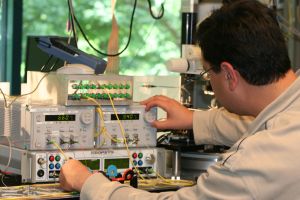Future energy supply requires experts having interdisciplinary knowledge. It is imparted by the new “Energy Technology” master program that addresses German and foreign bachelor graduates. The program is coordinated by the KIT Energy Center and represents a major element of training at the KIT School of Energy, a school of life-long learning for master students, young scientists, and professionals. The master program will start in the 2012/13 winter semester. The application deadline will expire on September 30, 2012. International students requiring a visa for their stay in Germany are asked to apply until July 15.
The consecutive master program in “Energy Technology” is based on the bachelor programs in mechanical engineering, chemical engineering and process technology, and electrical engineering and information technology. It is the first element of the life-long qualification program offered by the KIT School of Energy of the KIT Energy Center. As a “school of life-long learning”, the School of Energy offers excellent education and research opportunities to master students, young scientists, and professionals in the energy sector.
“For a reliable, sustainable, and affordable supply of energy in the future, we will need experts trained in energy supply options,” says Professor Hans-Jörg Bauer, scientific spokesperson of the KIT Energy Center. He points out that problem solutions of this type will be of increasing importance to the economic performance of industrialized countries as well as to the development of threshold or developing countries.
“As a wide range of subjects is offered, students are enabled to systematically study interdisciplinary aspects of energy technology and to participate in the development of novel, interdisciplinary solutions for reliable energy supply,” says Dr. Julia Johnsen, coordinator of the KIT School of Energy. The new separate master program complements the range of specialized study courses at KIT, such as energy and the environment (Mechanical Engineering) or the studies model “Regenerative Energies” (Electrical Engineering and Information Technology). Most of the courses are offered in the English language.
The program provides comprehensive training in energy technology: Basic modules convey general engineering knowledge to the students. In addition, the energy experts-to-be can focus on certain aspects, for instance, on renewable energies and energy storage technology and apply their know-how in interdisciplinary projects and traineeships. Other courses deal with mathematical methods, modeling, and simulation.
More information on the Energy Technology program may be obtained at http://www.energy.kit.edu/312.php.
Karlsruhe Institute of Technology (KIT) is one of Europe’s leading energy research establishments. The KIT Energy Center pools fundamental research with applied research into all relevant energy sources for industry, households, services, and mobility. Holistic assessment of the energy cycle also covers conversion processes and energy efficiency. The KIT Energy Center links excellent competences in engineering and science with know-how in economics, the humanities, and social science as well as law. The activities of the KIT Energy Center are organized in seven topics: Energy conversion, renewable energies, energy storage and distribution, efficient energy use, fusion technology, nuclear power and safety, and energy systems analysis.
Research, education, and innovation at KIT foster the energy turnaround and reorganization of the energy system in Germany. Clear priorities lie in the areas of energy efficiency and renewable energies, energy stores and grids, electromobility, and enhanced international cooperation in research.
In close partnership with society, KIT develops solutions for urgent challenges – from climate change, energy transition and sustainable use of natural resources to artificial intelligence, sovereignty and an aging population. As The University in the Helmholtz Association, KIT unites scientific excellence from insight to application-driven research under one roof – and is thus in a unique position to drive this transformation. As a University of Excellence, KIT offers its more than 10,000 employees and 22,800 students outstanding opportunities to shape a sustainable and resilient future. KIT – Science for Impact.

